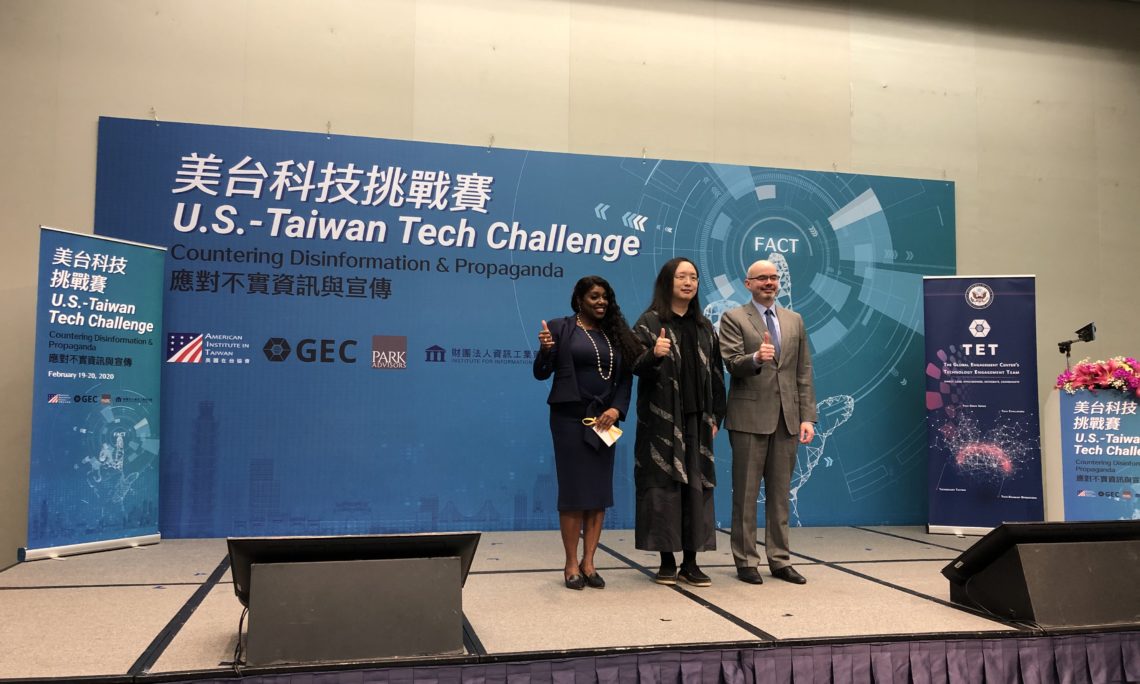OT-2003
February 19, 2020
Remarks by Patricia Watts
Director of the Technology Engagement Team of the Global Engagement Center
at U.S.-Taiwan Tech Challenge Day 1
February 19, 2020
(As Prepared for Delivery)
AIT Deputy Director Raymond Greene, Digital Minster Audrey Tang, Principal Deputy Coordinator Daniel Kimmage, and distinguished guests, good morning!
On behalf of the American Institute in Taiwan and the Global Engagement Center of the U.S. Department of State, we thank you all for being here today. I am Patricia Watts, the Director of the Technology Engagement Team at the Global Engagement Center.
I want to a start by giving you a little information about the GEC to serve as context for today’s Tech Challenge.
The GEC is charged with leading the U.S. government’s efforts to counter malign foreign propaganda and disinformation.
The GEC was created by Congress in 2017 to “Direct, lead, integrate, synchronize, and coordinate efforts of the Federal Government to recognize, understand, expose, and counter foreign state and non-state propaganda and disinformation efforts aimed at undermining United States national security interests.”
One of the GEC’s core functions is to “facilitate the use of a wide range of technologies and techniques by sharing expertise among Federal departments and agencies, seeking expertise from external sources, and implementing best practices.”
We simply want to use technology already widely available to the private sector in this fight. Whether it’s leveraging censorship circumvention tools, web-enabled literacy tools, blockchain-based authentication tools, dark-web monitoring, social listening tools, data analytics tools or buying online targeted advertising—there is clearly a lot more we can be doing to counter foreign propaganda and disinformation.
So Today we have invited a strong group of technologists with a wide array of capabilities to the U.S.-Taiwan Tech Challenge. Seven of them were selected from the Tech Challenge open competition to demonstrate their technologies with the goal of putting their capabilities to use against the problem of propaganda and disinformation in this region. 1 to 3 of these 7 companies will be awarded a grant from the Global Engagement Center, which will be announced at an Award Ceremony tomorrow afternoon. Quickly I would like to introduce the seven companies:
MGP FactCheck is a civil society organization based in Taiwan that serves users directly on Line, the leading messaging app in Taiwan, either by responding to fact-checking requests or by pushing messages about already identified fake news. Their detection system includes text, images and videos.
The Australian Strategic Policy Institute (ASPI) is an independent, non-partisan think tank based in Australia. Their Influence Tracker provides insights into coordinated disinformation operations through a dashboard that shows the networks that spread disinformation, illuminates the sharing patterns that ensure, and identify opportunities to respond.
TrendMicro is an enterprise data and cyber security firm based in Taiwan. Dr. Message is a free detection tool for identifying disinformation on Line, the leading messaging app in Taiwan. They aim to verify content as well as trace its path, and then offer users options to filter out disinformation.
Cyabra is a cybersecurity and social listening tool focused specifically on countering disinformation. It is based in Israel. It is a platform for social listening and detection of fake news across major social media platforms using AI-based technologies to detect bad actors and identify visual content manipulations via deep fakes.
Taiwan AI Labs is developing next-generation AI solutions to determine the credibility, bias & balance of news content, in particular on PTT, Taiwan’s equivalent of Reddit.
Chunghwa Telecom is the largest telecommunications company in Taiwan. Their Correct Message Clarification Mechanism integrates opinion tracking, profile analysis, and identification of propaganda and disinformation to enable the delivery of clarifications to those targeted by disinformation.
Teemo Chuang is a freelance developer who is making a tool for social listening for Taiwan’s largest, anonymous, online discussion community. The tool provides identity verification for accounts while helping them maintain anonymity.
Today is a key part of our effort to make our engagements with the tech sector more regular and ongoing—to ensure your knowledge and expertise is at the fore front of our work. I’m very excited and thankful you have joined us today and without further ado, let’s begin today’s activities.
















![Video Thumbnail [Recovered]-01](../wp-content/uploads/sites/269/Video-Thumbnail-Recovered-01-1-750x450.jpg)





